


























































Tina Knowles announces book tour I know Beyoncé fans are counting down to the Cowboy Carter Tour in April, but if you can’t make the concert and you’re in Houston, you might have the next best thing—her mama, Tina Knowles.
The businesswoman, fashion designer, art collector, and all-around powerhouse is hitting the road for a nine-city tour to promote her memoir Matriarch, which will be dropping on April 22.

Of course, one of her stops is right here in Houston at the Smart Financial Centre in Sugar Land on May 5. The best part? Former Destiny’s Child member Kelly “I Slay All Day” Rowland will be the moderator. Now, that’s a nice reunion.
According to the press release, Matriarch is “a page-turning chronicle of family love and heartbreak, of loss and perseverance and of the kind of creativity, audacity and will it takes for a girl from Galveston to change the world.” I love that Ms.Tina is taking charge of her story and telling it her way.
Ms. Tina has been shaping culture behind the scenes for decades—first through fashion, then through her daughters’ careers and now with this memoir. She’s proof that reinvention has no expiration date. This will be one for the books—literally.
UH Men’s Basketball team makes it to the Sweet 16… Again!
WHOSE HOUSE???
The No.1 seeded Houston Cougars are officially on the longest active Sweet 16 streak in the nation after knocking off Gonzaga 81-76 in Wichita. That makes six straight Sweet 16 appearances—an achievement that deserves way more hype than it’s getting.
Before this game, Gonzaga had the longest streak with nine straight trips to the Sweet 16, and Houston was right behind with five. This was the first time in NCAA history that two teams with five or more consecutive Sweet 16 appearances faced off. Something had to give, and Houston came out on
top, largely thanks to L.J. Cryer and J’Wan Roberts, who combined for 48 points.
The Coogs are set to take on No. 4 seed Purdue on Friday, March 28, in Indianapolis. I don’t know about y’all, but I believe they can keep this momentum going. This team isn’t just good—they’re consistently great. And in a tournament known for unpredictability, that kind of sustained excellence is not easy to come by.
Tyler Perry’s ‘Duplicity’ tackles police violence and injustice
Tyler Perry has always been a polarizing figure in Black cinema. People either love his work or criticize it for portraying Black culture. But say what you want—he’s telling stories that resonate, and his latest film, Duplicity, is no different.
Now streaming on Prime Video, Duplicity follows a lawyer fighting for justice after a white police officer shoots her best friend’s husband. It’s a legal drama with all the signature Perry twists and turns, but at its core, it’s about something bigger—police violence and systemic injustice.
We always see headlines like this, and honestly, that’s the problem. We’ve become numb to these tragedies. If nothing else, this film forces people to engage in the conversation again. Could the storyline have been fleshed out more? Probably. But instead of critiquing the execution, I focused on the message. Perry has built an empire, and one thing I respect about him is his commitment to putting new Black talent on screen—and paying them what they deserve. So, no, Duplicity isn’t perfect. But if it sparks a conversation or makes even one person think about the real-world issues it reflects, then it did its job.
• Check out our DN+ channels featuring stories for Black women, Community Central, and Under 40.
• Find out what sisters want from Black men.
• Defender Roundtable: The team discusses Rep. Jasmine Crockett’s comments about Gov. Greg Abbott.
By ReShonda Tate
Essential services such as police patrols, home repairs, heavy trash pickup, and public service announcements are currently on hold in southwest Houston’s District J, now rebranded as “J City.” The halt comes amid growing tension between City Councilmember Edward Pollard and Mayor John Whitmire.
“Almost every program that I’ve listed has been approved at some point in the past,” Pollard said. “But now, all of a sudden, our initiatives can’t move forward.”
Pollard claims the Mayor’s office is blocking the renewal of several key initiatives that had previously received the green light, including the District J Patrol — a community policing model that allowed residents to report quality-of-life issues directly to Houston Police Department substations for rapid response.
In a written statement, a spokesperson for Whitmire said the administration is “working with Council Member Pollard to ensure his requests can be fulfilled through the city’s existing use of contractors and procurement to address constituent concerns rather than initiating new ones as he proposed.” The mayor’s office added that the city’s charter limits how programs can be implemented and emphasized that public

service announcements could still be issued through existing services.
However, District J residents and community advocates are raising their voices in support of the stalled programs. During a public comment session earlier this month, Gena Sylvester, a resident, addressed the Mayor directly.
“I voted for you as a Republican, thinking

that you were truly the right guy for the job, but this latest issue with a decision with District J Patrol is worrisome to me,” Sylvester said.
Bert Ruiz, another resident, echoed those concerns: “These programs address critical service gaps that the city is still working on to resolve, and their absence would be deeply felt in our community. I respectfully request
that the mayor’s office renew them by the end of this month.”
Though supplemental maintenance and beautification services continue, Pollard says the delay in renewing public safety initiatives is especially concerning in light of recent violence.
“In the past few weeks, we’ve seen troubling violent incidents across District J— from a mass shooting at an after-hours club in Gulfton to random gunfire terrorizing families in Sharpstown,” Pollard said. “Unfortunately, despite the urgency, vital public safety programs in District J remain stalled due to decisions made by the Mayor’s office.”
Pollard emphasized that District J is the only council office experiencing such pushback.
“Since I took office, District J has invested over $1 million into HPD to improve public safety,” he added. “Now, those efforts are being held up.”
Pollard urged residents to contact the Mayor’s office and demand approval for HPD overtime funding and other suspended programs.

By ReShonda Tate
A downtown Houston street that runs past City Hall could soon bear the name of the late Congressman and former Mayor Sylvester Turner, thanks to a proposal by City Controller Chris Hollins.
“He left an incredible legacy,” Hollins said. “He’s deserving of honor, and renaming a street in the heart of our city is just one way we can pay tribute to his memory.”
Turner, who served two terms as Houston’s mayor, spent more than 25 years representing Northwest Houston in the Texas Legislature. Hollins, who now holds the city controller position, said Turner played a pivotal role in his own political journey.
“Long before I was involved in politics, before he had any reason to invest in me, he made himself available,” Hollins said. “Over time, he became a mentor and a dear friend.”
Hollins introduced the renaming proposal during a recent City Council meeting, where he became emotional while reflecting on Turner’s influence.


Mayor John Whitmire responded by thanking Hollins for his suggestion, signaling openness to honoring Turner’s legacy.
City Council Member Tiffany Thomas expressed her full support for the initiative. She noted that Turner already has a park named in his honor in his home neighborhood of Acres Homes, and community members have also launched a petition to rename the Bethune Empowerment Center after him.
“There’s a strong appetite for this because people recognize the depth of his contributions,” Thomas said. “I want to publicly align myself with the Controller’s proposal. I would absolutely support the renaming of the street.”
For the renaming to move forward, Houston’s planning department requires a petition showing support from at least 75% of property owners along the stretch of Bagby Street in question. Because the city owns the majority of those properties, only one additional private property owner would need to sign on. Other property owners include Landry’s Group (which owns the Downtown Aquarium), Tennison Lofts (an apartment complex), and Brookfield Asset Management (owner of Heritage Plaza and a nearby parking garage).
A Brookfield spokesperson said the company hadn’t yet received the proposal.
Hollins and Thomas are also backing a separate initiative to rename a terminal at George Bush Intercontinental Airport in honor of the late Congresswoman Sheila Jackson Lee, who previously represented Texas’ 18th Congressional District before Turner. That resolution has already received unanimous approval from the City Council.
By Tannistha Sinha
Senator Royce West (D-Dallas) who serves District 23, has long been vocal about public education, criminal justice reform and healthcare access in Texas.
As Texas continues to navigate diversity, equity and inclusion (DEI) bans, Medicaid funding cuts and law enforcement accountability, West remains clear on his stance on these issues—to push for policies that ensure equity for vulnerable communities.
West was first elected 33 years ago to the Texas Senate in November 1992 and represents the 23rd Senatorial District in Dallas County.
A University of Texas at Arlington graduate, who earned a Juris Doctor from the University of Houston Law Center, West initiated the establishment of the University of North Texas at Dallas, a new law school in downtown Dallas and a pharmacy school.
West shared his concerns about school vouchers, which he argues disproportionately benefit wealthier families. He said he does not foresee Senate Bill 2, a voucher-like program where public funds could be used to support private schools, to benefit Black and low-income students.
Gov. Greg Abbott made the bill an “emergency item,” which was passed by the Texas Senate and now awaits consideration from the Texas House.

This is not new, as voucher proposals have passed through the Senate several times in 2023, but died in the House each time due to opposition from Democrats and rural Republicans.
We have to get our best thinkers on this particular issue to help us come up with some policies that will be able to ensure that we don’t lose any ground in this area while we battle this DEI mess in court.”
SEN. ROYCE WEST
Drawing comparisons to Arizona’s voucher system, West warned that Texas’ version could subsidize private education for families who can already afford it rather than expand opportunities for marginalized students. He also sees echoes of segregation-era voucher programs, which allowed white families to flee desegregated public schools.
“The vast majority of kids that will use these vouchers will be Anglo,” West said. “It’s just a subsidization of private school education that’s already been paid for by persons that could afford it. I think that’s gonna happen here in the state of Texas.”
Lawmakers prohibited DEI offices and programs in public universities in the last legislative session. West proposes a race-neutral approach, similar
to the Top 10% Rule, which provides automatic admission to state universities for Texas high school students who graduate in the top 10% of their classes. He said it could be one solution to the recent backlash against admissions and hiring based on the applicant’s race and ethnicity.
“We have to get our best thinkers on this particular issue to help us come up with some policies that will be able to ensure that we don’t lose any ground in this area while we battle this DEI mess in court,” West said.
West passed legislation that placed dash cams in Texas law enforcement patrol vehicles, bulletproof vests and body cameras for law enforcement (SB 158).
He also advocated for SB 30, which contained guidelines for citizens and officers on responding to traffic stops and other interactions. West recommended Texas law enforcement agencies to record the interrogations of those arrested on felony charges and
passed legislation updating the Texas racial profiling law in 2001 (SB 1074).
During the current 89th legislative session, West introduced SB 1421, which establishes guidelines for using less-lethal force weapons by law enforcement officers in Texas. It defined the weapons as those designed to incapacitate a target while minimizing the risk of serious injury or death, including stun guns.
By Laura Onyeneho
Jordan J. Edwards remembers the exact moment his life changed. It was 2013, and at just 21 years old, he received the news that he was HIV-positive.
A wave of fear washed over him.
“It felt like I was in a movie, waiting for someone to yell ‘cut,’” he recalls.
He had dreams and aspirations—ones that he feared might be lost in an instant. More than the virus itself, it was the stigma that weighed on him, keeping him isolated and unsure of where to turn.
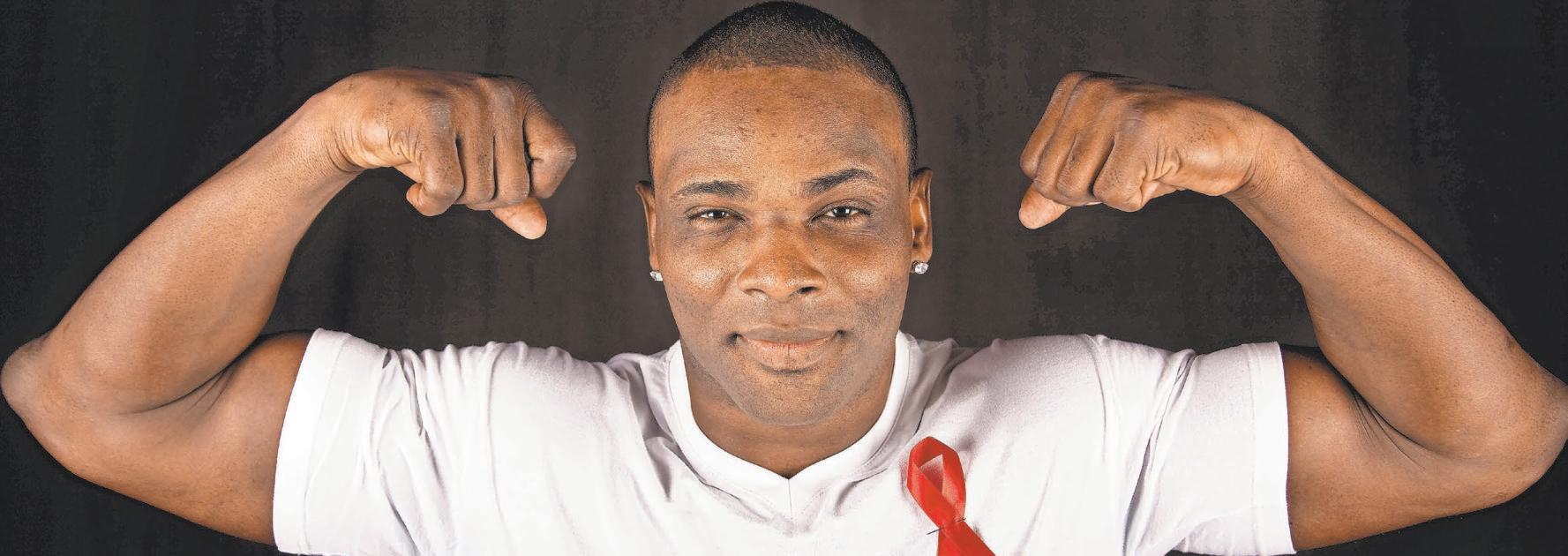
Now, 12 years later, Edwards is a longterm survivor and the deputy director at The Normal Anomaly Initiative, a Houston-based organization dedicated to empowering Black, queer individuals through education, advocacy and community support.
He is using his voice to shift the narrative about HIV in Houston’s Black community, where stigma and misinformation remain barriers to prevention and treatment 365 days a year.








HIV continues to disproportionately affect Black communities in Houston and across the country. According to the Houston Health Department, Black residents make up nearly half of new HIV diagnoses in the city, despite being only about 23% of the population. Black gay and bisexual men are at particularly high risk, as are Black women, who make up a growing percentage of new cases.
About 12% of Texans are Black, and in 2022, 38,547 Black persons had been diagnosed with HIV, accounting for more than one-third of all Texans living with the virus.
Marlene McNeese, deputy assistant director at the Houston Health Department, says HIV is not limited to one group. If people are sexually active, they can acquire HIV. The goal is to work against misinformation and ensure people understand their risk and the importance of testing.
“Many people still believe that HIV is a death sentence or


that it only impacts certain communities,” she says. “The truth is, HIV is manageable with proper treatment, and there are prevention tools like PrEP (Pre-exposure Prophylaxis) that can significantly reduce the risk of transmission.”
Despite advancements in medicine, barriers to care persist.
“Many people don’t realize that there are affordable, even free, services available for testing and treatment,” McNeese says. “We work closely with community organizations to ensure these services reach those most in need.”
Jai the Gentleman, host of the Dear Black Gay Men podcast, has a similar mission, but his journey to advocacy started in an unexpected way. What began as a podcast to share dating experiences among Black gay men quickly transformed into a platform for deeper discussions about identity, relationships, and health.
“The first episode of my podcast was because I got stood up for a date,” Jai says.
“I just wanted to talk to Black men like me about dating, but the conversations naturally shifted over time. People started opening up about their struggles, including HIV.”
Through his podcast, Jai discovered a glaring issue: a lack of accessible, and relatable conversations about HIV within the Black gay community.
“I realized that many Black gay men either didn’t know enough about HIV or believed that it was an inevitable part of being a sexually active Black man,” he says. “That’s the mindset I’m working to change.”
Jai also says the cultural and societal pressures that fuel stigma. For a lot of Black men, masculinity is tied to how we are perceived in our communities.
“If you even bring up HIV, some people assume things about your sexuality, your worth, or even your value as a partner,” he says. “We have to break through that fear and have real conversations about health.”

By Terrance Harris
George Foreman was a lot of things to a lot of people at different moments in his life.
He went from being a thug in the streets of Fifth Ward to Olympic boxing champion, to Heavyweight Champion of the World to a caring and giving figure who still had a mean streak, to the victim of “the Greatest of All-Time,” to becoming a street preacher. Miraculously, Foreman did a reset at 39 years old, but this time as a jovial and likable figure who was even more giving and defied the odds and logic by again becoming the Heavyweight Champion of the World at 45.
Houston sports radio legend Ralph Cooper had a front-row seat for much of Foreman’s evolution to becoming one of the heavyweight greats.
“What I learned about George is he was a very giving person,” said Cooper, who Foreman hired as his public relations guy back in the 1970s. “He wasn’t perfect now. He made mistakes. But he was a very giving person not only to family and friends but to others that he didn’t even know.
And he did that consistently over the years.” Foreman–all 6-foot-4 and 300-plus pounds of him—was indeed larger than life. He was that to those closest to him and those who knew him probably better as the ultimate pitchman or the smiling baldhead guy whose name is attached to your favorite kitchen appliance. The iconic Foreman and Houstonian died on March 21. He was 76.
“We will miss George, but I will celebrate his life and his spirit lives on,” legendary boxing
promoter Don King said to the Defender. “He has gone to the house in heaven now and has left the motor house here on earth. I told George to keep a light in the window because I will be there. Hang in there Big Buddy.”
Two Georges
Foreman will forever be remembered for his big personality and friendly spirit. But he will also be remembered as a menacing figure, who struck fear in his opponents before he entered the ring.
One of the hardest punchers that the fight game has ever seen, Foreman had a lot of fights and knocked out a lot of opponents (68). But four moments in the ring will forever define his career.
We will never forget him waving the miniature American flag in the ring after winning the Mexico Olympics in 1968, or brutal pummeling of Joe Frazier in two rounds to win the Heavyweight Championship in 1973, the spectacle known as the “Rumble in the Jungle” when an undefeated 25-year-old Foreman was stunned by an older Muhammad Ali with an eighth-round knockout and then finally the punch that floored Michael Moorer and made Foreman a champion again at 45.
Cooper was there with Foreman in Zaire for the fight against Ali. What was supposed to be a short trip to Africa for the bout turned into an eight or nine-week stay after the fight was delayed because Foreman suffered an injury while sparring.
It was an iconic moment in boxing because of the two fighters involved, the fact that King, a boisterous Black man, was promoting the fight and he had gotten Zaire dictator Mobutu Sese Keko to put
up the money for a fight that grossed an estimated $100 million in worldwide revenue.
“What he and Ali did and Don King did in Africa, most people will never understand it because they were not there,” Cooper said. “But it was a spiritual enlightening that I owe him forever because he gave me a job and he allowed me to experience that whole thing and I got paid and I became a prince while I was there.”
A lost George But for Foreman, it was a difficult awakening because suddenly, the undefeated 25-year-old was no longer the toughest and most feared man in boxing. Ali had taken that from him.
“That messed with him. He believed the press clippings,” Cooper recalled. “He had never been knocked down and never had been counted out. George being champion in his mid-20s and all of sudden you had that snatched away from you. So he took it hard.
“It bothered him when he lost his championship. He became, in my opinion, more moody and at times mean. That didn’t change until Puerto Rico.”
Spiritual awakening
It was in Puerto Rico that Foreman experienced his spiritual awakening, and the First Act of his boxing career ended. After winning five straight fights after losing to Ali, Foreman was stunned by a loss to journeyman Jimmy Young in 1977. Foreman returned home before long and became a street preacher and pastor to a small congregation.
Foreman was a forgotten man in the ring for the next decade until he devised a plan to stage a boxing comeback in the name of the Lord and the plan to raise money for his church. This Foreman, however, was different. No longer the chiseled 220-pounder, he was bald and pudgy around the midsection.
influence

stretched far beyond boxing. He inspired millions with his resilience, business savvy, and devotion to faith and community. As the world reflects on his remarkable life, we highlight a few of his most historic contributions:
1968 – Won a gold medal in the heavyweight division at the Mexico City Olympics, representing the United States just months after the assassinations of Dr. Martin Luther King Jr. and Robert F. Kennedy, making his win a symbol of perseverance for many Black Americans.
1973 – Captured the world heavyweight title with a stunning second-round knockout of the previously undefeated Joe Frazier, solidifying his place among boxing’s all-time greats.
1974 – Faced Muhammad Ali in the legendary “Rumble in the Jungle” in Zaire. Though Foreman lost, the bout became one of the most
iconic moments in sports history and elevated boxing’s global appeal.
1977 – Retired from boxing following a loss to Jimmy Young and experienced a profound spiritual awakening, later becoming an ordained minister.
1980 - Founded the Church of the Lord Jesus Christ in Houston
1994 – Made an unprecedented comeback to win the world heavyweight title at age 45 by defeating Michael Moorer. He became the oldest fighter ever to win a heavyweight championship—a record that still stands.
1990s–2000s – Became a cultural icon through the wildly successful George Foreman Grill, selling over 100 million units worldwide. The grill turned Foreman into a household name and one of the most successful athlete

Foreman contacted Bob Arum to be his promoter and Arum declined. He didn’t really know Foreman during his first stint as a fighter, but what he did know he wasn’t impressed.
After initially rejecting Foreman, Arum agreed to meet with the aging boxer in Las Vegas and was blown away by what he saw and heard.
“My first impression was, `This is the greatest con man I’ve met,’ because he was a completely different person,” Arum said to the Defender. “Soft-spoken, sensible, really nice.”
Champion – again
“He got a little too close and got clipped and George became the Heavyweight Champion,” Cooper said. “And that changed everything.”

The legacy Foreman leaves behind Foreman had a few more fights before giving up his gloves to work as a boxing analyst. He is the ultimate pitchman and the most loveable man in sports.
“I loved George Foreman. George Foreman was a great guy. He demonstrated what the poor and downtrodden, underprivileged and denied could do if they had the confidence in themselves,” King said. “He set that example for his generation and the generation that followed. He was a fabulous guy and I celebrate his life because he became champion of the world and he did it in a manner with his self-confidence and physical prowess. He was iron man, is what they called him.

Arum agreed to work with Foreman, setting him up with a few easy fights before putting him in the ring with heavyweight champions Evander Holyfield and then Michael Moorer. Foreman was older and definitely lacked the reflexes of his younger self, but he still could take a punch and deliver one, too.
Foreman and Holyfield went the distance, landing hard blows on each other, but the younger Holyfield won that decision. But in the bout with Moorer, one of the best knockout artists in the fight game, Foreman landed the blow he needed, sending Moorer to the canvas and making him a 45-year-old Heavyweight Champion.
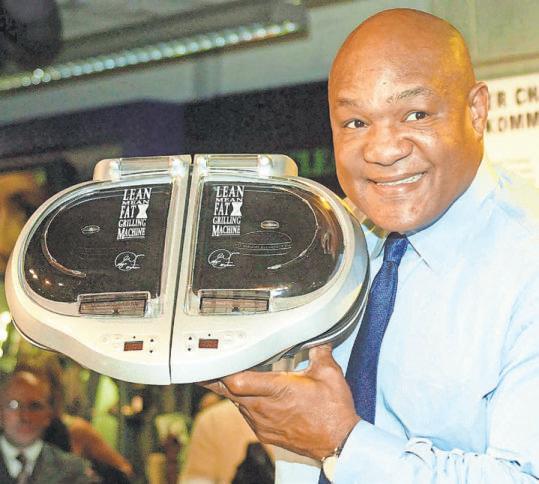
Getty
entrepreneurs in history. Faith & Community – Founded a church in Houston and dedicated his post-boxing life to mentorship, community outreach, and improving lives through faith-based initiatives.
religiously and he was older, he had more respect for what he had accomplished and who he had become again,” Cooper said. “He became more of a philanthropist and he became more of a person who cared more about other people. He was signing autographs, kissing babies and taking pictures and all that kind of stuff. He rarely did that when he was younger, but the second time around all of that changed.”


“The Lord giveth and the Lord taketh away, but George was a good example.”
Arum says he will miss Foreman, who later became a close friend.
“This is my small way to see that George is remembered for the person that he became and was because he was truly a remarkable, remarkable person and his whole story is almost of Biblical proportions,” Arum said.
Cooper, who saw Foreman from all angles, believes he leaves a legacy by turning a bad situation into a good one and seizing his opportunity.
“Because he had changed


Friends respond to death of George Foreman
By Aswad Walker
Two-time World Heavyweight Champion and proud child of Houston’s Fifth Ward, George Foreman, famously said on multiple occasions “The most unbelievable story I ever heard of was the George Foreman Story.”
To those words, he often added, “I didn’t think it was possible, but I worked hard anyway. I came, I saw, I conquered.”
And now the conqueror of foes in the boxing ring and business world, as well as his own internal opponent (depression) after his loss to Muhammad Ali, need not fight anymore. He passed away on March 21 at the age of 76.
Words of remembrance honoring Foreman have come in from near and far. Here are a few
of those celebrating not only Foreman the sports icon, but Foreman the humanitarian.
“In 1973, I was honored to welcome Foreman to the State Capitol along with my then-colleague, Mickey Leland. The world knew Foreman as a two-time heavyweight champion; we knew him as a proud member of our community — a man whose heart was as big as his powerful punch. George’s journey from the streets of Fifth Ward to boxing and business success was an inspiration. He never forgot where he came from, and his commitment to our city was constant. I extend my condolences to his family. Houston will forever be proud to call George Foreman one of our own.”

Fifth Ward. But most of all, George was my friend. I will miss him and so will the world.” Texas State Rep. Harold Dutton
Houston Mayor John Whitmire
“George was a fighter, a preacher, a boxer, a husband, a father, a champion, a grandfather, a humanitarian, a broadcaster and a businessman who was proud to be from
“The best way I can describe [Foreman] is when you watch a movie you see a villain or you see the good guy. Is that really how they are in real life? No. In the ring George Foreman was a beast. He was a monster. But outside of the ring he was like a big teddy bear. He had a giant heart. He loved to help people… went to his gym a few times. He supported me a few times when we had open workouts when I was training. It always gave me that little bit of extra confidence, like, ‘Hey, I’ve got George Foreman who’s from Houston, Texas, and I’m not the only one. That I have him in my corner.” Juan “Baby Bull” Diaz Lightweight World Champion and native Houstonian
By Aswad Walker
When most people mention the legacy of Houston’s historic Fifth Ward, the focus generally falls upon the long line of political powerhouses. And that’s understandable when you consider that this one neighborhood produced the likes of Congresswoman Barbara Jordan, Congressman Mickey Leland, Commissioner El Franco Lee and several others.


Though the trumpet and tuba-playing, Guy attended Prairie View A&M University (PVAMU) to major in music with ambitions of becoming a band teacher, he worked predominantly in higher education and finance. But he took full advantage of the opportunity to work with the FWCAD.


A huge part of Guy’s job is sharing Fifth Ward’s arts history and building upon it.
who then began to rattle off countless names of art giants—in fine arts, music, theater and more—produced by Fifth Ward.
But quiet as it’s kept, Fifth Ward’s art legacy is just as impressive, if not more so.
This north Houston neighborhood, known in its heyday as the “Harlem of the South,” has been experienciang a renaissance for years now. And it’s only expanding in brilliance, thanks in large part to the Fifth Ward Cultural Arts District (FWCAD).
Harrison Guy, founder and artistic director of Urban Souls Dance Company, is the director of arts and culture for the FWCAD, even though a career in the arts was his second love.
“I first wanted to be a preacher. I’m a church boy. I was in church probably every day, honestly. And probably four times on Sunday,” said Guy, who was bitten by the arts bug while participating in theater and band in school.
Guy is quick to let you know that Third Ward doesn’t have one of its anchor institutions, Project Row Houses, without the input of two of its Fifth Ward-born founders. And certainly, the arts world would not be the same without the award-winning productions penned by Dr. Thomas Melancon, another neighborhood child.
And there’s so much more.
“Fifth Ward is an African American cultural arts district as designated by the State of Texas. That means the state recognizes its legacy of Black residents who made the community what it is today. The FWCAD also uses arts as the vehicle for that memory,” said Guy,
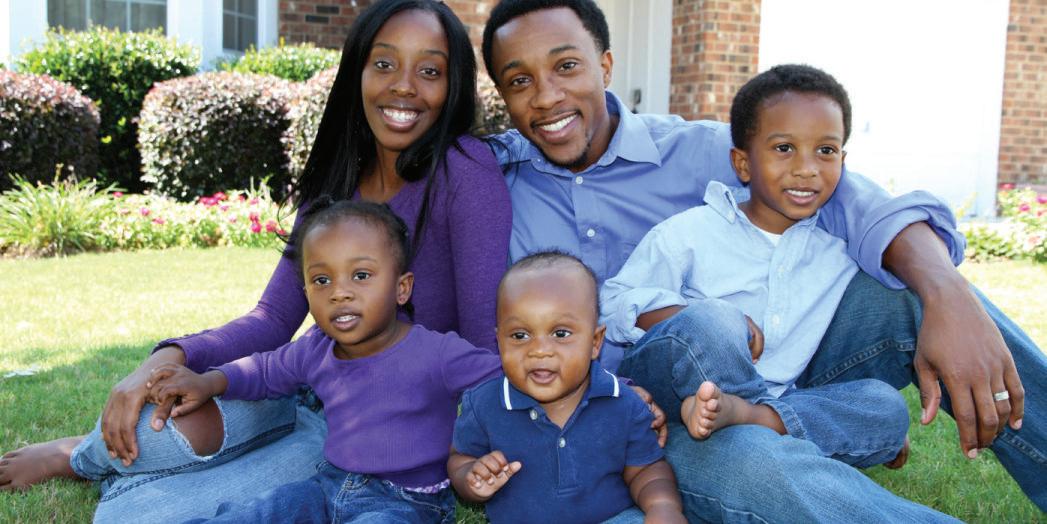
“[Regarding] the musical legacy of Fifth Ward, you have Peacock Records, the Motown before there was a Motown. Archie Bell and Drells are from Fifth Ward. Joe Sample and the Crusaders, out of Fifth Ward. We had the Club Matinee live music venue on Lyons. That’s where Ray Charles met his wife… The Laws family is a musical family from Fifth Ward. And then you have Rap-A-Lot Records, J. Prince, The Geto Boys... Little Richard found his touring musicians from Wheatley High School’s musical program,” shared Guy.

TO
The Metropolitan Transit Authority of Harris County, Texas (METRO) is planning to issue the procurement documents listed in this advertisement.
RFQ No. Doc1480499775: Pre-Employment Physical Examination On An ‘As Needed Basis’ Solicitation will be available on or about 03/17/2025. Prospective bidders/proposers can view and download these solicitations by visiting METRO's website at ridemetro.org/Open Procurements. If you are unable to download the documents or are having difficulty, please contact 713-739-6886 or email Contracts/Property Services at propertyservices@ridemetro.org.


By Laura Onyeneho
The digital age is redefining how stories are told for Black professionals.
This shift presents both opportunity and risk. Artificial intelligence (AI) and media algorithms influence which voices are amplified and silenced. Without intentional action, Black narratives could be misrepresented—or erased entirely.
Actor and activist Kendrick Sampson is among those leading the charge to ensure that Black storytellers maintain control over their history, culture and future.
At a town hall forum on Black storytelling and innovation at the Ion District, Sampson, Nana Gyamfi, Executive Director of the Black Alliance for Just Immigration (BAJI) and other industry leaders addressed the urgent need for Black people to engage with technology as decision-makers, not just consumers. The power of Black storytelling lies not just in representation but also in ownership and strategic influence.
“How do we build power? How do we use technology to build power? How do we use it to enhance our relationships instead of replacing their relationships?” Sampson said. “How do we come to use it to connect us further than divide us further? Because right now, it’s the complete opposite.”
AI is causing concern among Black artists, who are discovering evidence of racial bias in the algorithms and large data sets used to generate images. AI technologies may ignore or distort artists’ text prompts, impacting how Black people are depicted in images and sometimes stereotyping or censoring Black history and culture.
According to McKinsey’s report, generative AI could potentially widen the US racial economic gap by $43 billion annually. Still, it could also remove barriers to Black economic mobility if used thoughtfully.
AI impacts various industries, including TV, film, media, literature, music, beauty, health and wellness. Sampson shared his experience in Hollywood during the SAG-AFTRA strikes over labor disputes against the Alliance of Motion Picture and Television Producers (AMPTP) and the Disagreement over streaming residuals and regulation of self-tape auditions.
Studio usage of AI to scan actors’ faces to generate performances digitally.
Owing our narrative in the digital world
Gyamfi has been fighting for the rights of Black immigrants for decades, both nationally and internationally. When it comes to

storytelling and technology, she says AI has been used in a way that portrays Black people negatively.
“AI is often tested on Black people— whether it’s those in Kenya, Nigeria or Ghana—who are being used to clean up the most horrific images so that AI appears more palatable for others,” she says. “Meanwhile, AI is also being used to categorize us, keep us out of space and limit our opportunities. If we don’t take control, we will be the subjects of digital oppression rather than the architects of digital liberation.”
Educator and social media influencer
Conscious Lee says accessibility to technology is a solution. When he was in college, the internet became his way of finding information inaccessible to him. He watched various content creators who made “high-level knowledge” digestible for everyone.
“The people we’re competing with in the job market and in business are already
using AI and other tech advancements,” he says. “Instead of making it more accessible for our people, we sometimes hoard that knowledge. That’s gatekeeping. We must ensure we’re sharing resources and not leaving our community behind.”
He also pointed to the growing issue of AI-powered misinformation.
“Deepfakes and manipulated content are already affecting how people perceive reality,” Lee says. “If we don’t make sure our community is educated about these tools, we’ll be the ones most vulnerable to digital deception—especially in elections, media and business.”
Brittany King, founder and CEO of Amplify Allyship, expanded on the importance of Black people committing to trust-building and eliminating the crabsin-the-barrel mentality.
“We often talk about allyship in relation to other communities, but how do we, as Black
people show up for each other?” she asks. “That means no gatekeeping. That means we’re holding each other accountable, and that means that we are collectively pulling our resources for the benefit of us all.”
King left corporate America 18 months ago after facing the toll of being Black in a predominantly white workplace. She believes allyship starts within. She launched her company, Amplify Allyship because she believed allyship is the answer to the world’s societal ills.
She shared a personal story about a Black woman in leadership who supported her exit from corporate America but could have done more.
“I want a job that’s not here. I can’t go to places and tell people this is a safe place for black people. “We need to have more conversations about first-generation corporate leadership and our responsibility to lift each other up.”
By Terrance Harris
When LaJean Gould worked in communications not long after finishing up graduate school, it seemed like clockwork every Friday afternoon her office cleared out for the day – except for her.
She would always see the men in her office dressed in loafer shoes, khaki pants, a suit jacket, a dress shirt and no tie. They were shuffling off somewhere to spend Friday afternoons, but Gould didn’t know where.
All she knew was that the disappearing men were suddenly being promoted or in consistent good standing with the bosses. It wasn’t long before Gould realized the disappearing act was because the men in her office were spending the afternoon hours on the golf course, where deals were made and promotions were given out. Gould was outside those deals until she became wise to the game.
“It took me a while to figure out why am I the only one still here,” Gould recalled in a recent conversation with the Defender. “I don’t have vacation to take and I don’t think they are on vacation. But you figure out through conversations that they’ve been playing golf.
golf, but she quickly understood that women – particularly Black women in business –needed to have golf in their repertoire if they hoped to advance in business and be on the ground floor of major deals and business opportunities. It wasn’t long before the idea of forming an organization hit her. She founded what is now known as Women In Golf Foundation, Inc. which has become instrumental in introducing Black women to golf at an early age and then growing their games to the point where many can compete for college scholarships and others can use the game as a tool in business.
Today, Women in Golf Foundation Inc. has three components—youth, collegiate and executive women—all of which aim to grow the sport among Black women.

“The more I learned about the game, the more I Iearned about the benefits of the game, the more I realized that this a really important sport,” said Gould, whose organization has garnered the attention of the PGA of America, LPGA and USGA. “We’ve been kept from this sport for so many years for a reason.”
reality is not everybody is going to go off and turn pro.”
Prairie View coach Mesha Levister, who has the rare distinction of being a woman who oversees both the men’s and women’s programs, had her first experience with the National Women’s Golf Championship last year and thoroughly enjoyed the experience and its meaning.
“I feel like LaJean has done a wonderful job of really empowering these young ladies and helping them make connections and just helping HBCU golf for the women to feel inclusive and have a tournament like this,” Levister said. “This foundation is pretty amazing.”
Gould, who is based in Atlanta, has been at the forefront and grown the tournament from what she likes to say was 9-holes and
WHAT: 2025 Women in Golf Foundation Inc’s National Women’s Collegiate Golf Championship
WHERE: The Golf Club at Katy Ranch
WHEN: March 30-April 2
PARTICIPANTS: There will be 11 HBCU programs, including Prairie View, Texas Southern and Howard in the four-day tournament.
LAST YEAR’S CHAMPIONS: Howard Univesity and Paine College tied for first place.
some lessons to 54 holes and a national championship. She is proud of what the tournament has been able to do for Black women in golf and looks forward to even more.
The tournament expanded last year from 36 holes to 54 holes to help the participating teams with NCAA rankings.
“It’s a lot more work on everybody, including the kids who play,” Gould said. “But it basically signals to everybody that is involved that what we do is real and what we do matters and what we do ranks with the best of them out there.”
“Long story short, I set out as part of my professional development was to learn to play golf.”
And learn, Gould did.
Not only did Gould pick up the game of

I feel like LaJean has done a wonderful job of really empowering these young ladies and helping them make connections and just helping HBCU golf for the women to feel inclusive and have a tournament like this. This foundation is pretty amazing.”
MESHA LEVISTER PRAIRIE VIEW COACH
Women in Golf Foundation Inc. has been about developing golfers and exposure during its now 30 years of existence, and its signature event is the National Women’s Collegiate Golf Championship, which is headed back to The Golf Club of Cinco Ranch in Katy for the second straight year from March 30-April 2. The tournament which is expected to host 11 mostly HBCU women’s programs, including Texas Southern and Prairie View, is a three-day, 54-hole event that will encompass far more than golf.
There is also a networking component with former players who played in the tournament, professionals, and executives from the presenting sponsors, Arcis and HEB.
TSU assistant coach Sylvia Masango played in the National Women’s Golf Championship as a student-athlete at Alabama State University. She made connections and friendships that have endured more than a decade later. She says the whole experience is invaluable to all of the young ladies who will participate.
“I actually appreciated the program and still do because it shapes our young women for who they will be and not just where they are in the moment which is being collegiate student-athlete,” Masango said. “The

The Women’s in Golf Foundation Inc’s National Women’s Collegiate Golf Championship, which features 11 HBCU teams, is set to return to The Golf Club of Cinco Ranch in Katy for the second straight year from March 30-April 2.
Credit: Women’s in Golf Foundation Inc.






By Jimmie Aggison
At Jack Yates High School, where resources are scarce and interest in baseball is often low, two brothers are leading a determined baseball team to success.
Kylen and Kyle Nicholson, fraternal twins who have played the sport since they were three years old, prove that passion and hard work can overcome even the toughest challenges.

They have become the driving force behind the Yates baseball program. With Kylen and Kyle standing at 6-feet-6 inches and 6-feet-2 inches, respectively, the brothers have competed in various sports over the years, but baseball has always been their true passion.
“My mother made sure we had options to play every sport,” said Kyle. “Baseball is just the sport that came naturally to us. The fact that not many Black kids play baseball is what made me and my brother different. Compound that with our skills, that’s what made us stand out.”

Growing up in a neighborhood where resources were limited by financial hardship, crime and a lack of interest in the sport, the brothers were intro duced to baseball at a young age to keep them out of trouble.
“My mother kept us into sports to keep us out of trouble,” said Kylen. “My father was away serving a sentence, so she tried her best to keep us out of trouble. Playing sports helped me create my iden tity while learning how to work hard and set goals.”





The brothers’ journey in baseball began at Sun nyside Park. They later played four seasons with the Houston Monarchs during high school and became four-year varsity lettermen at Jack Yates High School.
While both brothers excelled at their natural posi tions—Kylen at first base and Kyle at third base— the team faced a unique challenge during the 2025 spring season. Not all players came to the team with the same level of experience. This led the brothers to adapt, taking on new roles to fill the team’s needs.

“We started trying out pitcher and catcher in a few games last season, but this season, we actually put them into play, recognizing this would give us the best opportunity to win games,” said Kylen.
ABOUT
Class: 2025

IG: @walkdown_twinn
Twitter: @kylenicholson07
Position: Catcher, third baseman
Height & weight: 6-feet-2, 190
pounds
Favorite artist: Lil Baby

Status: Uncommitted
Favorite subject: Math

Kylen has emerged as the team’s most reliable pitcher, a role he embraces confidently.
“Kylen is the most consistent and confident pitcher on our team,” said Jack Yates coach Emmanuel Ajiodo.
“With him pitching and Kyle doing a superb job behind the plate, we are seeing the team move as a unit and we are seeing success.”

Kylen credits much of his playing style to studying the game of former MLB player John Olerud, who helped the Toronto Blue Jays win two consecutive World Series championships in 1992 and 1993.
“He reminds me of myself,” said Kylen. “He’s left-handed, tall, and plays first base, but he also pitched while at Washington State University.”
On the other hand, Kyle draws inspiration from baseball legend Jackie Robinson, who helped break racial barriers and inspire future generations of African Americans to take up the sport.
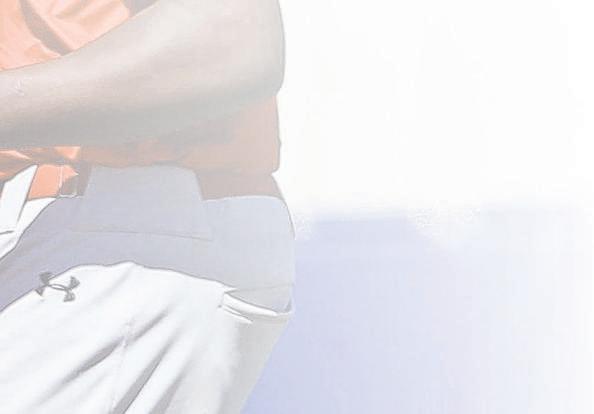
“Jackie Robinson broke the color barrier in Major League Baseball, showing incredible courage and perseverance,” said Kyle. “He faced adversity with strength, inspiring countless people to stand up for equality. Jackie Robinson’s talent and integrity, both on and off the field, make him a true role model.”

Despite the challenges the team has faced—limited resources, lack of interest from the community, and limited players with previous experience—the Yates Lions have found success through their unity and desire to win. After finishing the 2024 spring season with a 2-10 record in the 4A Region III District 21, the team is off to a much stronger start this season, boasting a 5-1 record.
“It feels good playing with my brother,” said Kylen. “I wouldn’t change for anything. We have a connection when we both are on one accord and not arguing. This is our second year playing pitcher and catcher, and we are doing a hell of a job at leading this team with a 5-1 record. We had to step up as leaders and get out of our comfort zone for us to be able to start winning games.”

Class: 2025
IG: @luhh__twinn

Position: Pitcher, first baseman
Height & weight: 6-feet-6, 205 pounds
Favorite artist: Dee Baby
Status: Uncommitted
Favorite subject: Math





Shout-outs: God, Mom, Dad, Coach Ajiodo and Coach Mike

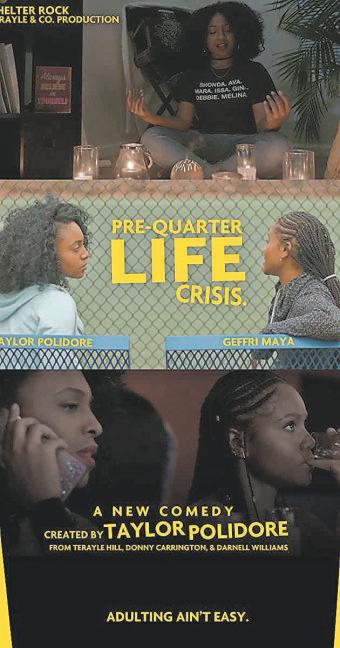


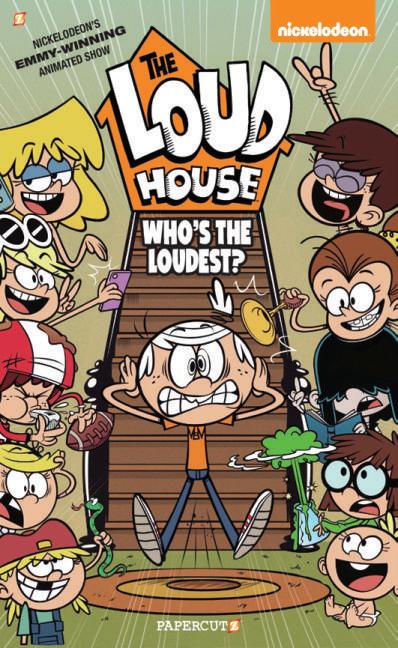
By Aswad Walker
When the Defender first met Houston-born actress and entrepreneur Taylor Polidore Williams, her career was classified as “on the rise.” And rise it has.
Last year Polidore Williams appeared in Tyer Perry’s “Divorce in the Black.” Currently, she’s starring in another Perry production, the current Netflix hit “Beauty in Black,” which released season two earlier this month.
Polidore Williams, who portrays “Kimmie” in her latest project, has her face plastered on billboards all around the Bayou City promoting the show. Yet, this newlywed, who tied the knot here in Houston in May 2024, has never deviated from keeping her feet firmly planted on the ground.
And that’s saying a lot, especially when considering her resume boasts stints on some of this decade’s most popular shows, including “Black Lightning,” “All American: Homecoming” and “Snowfall.”
Her success may surprise some, but not her. Polidore Williams has known for a while the career path she’d pursue.
“I decided that I wanted to be an actress professionally as my career when I was 13, and I never really like looked back from there,” said Polidore Williams, whose first film appearance, “Welcome Home Roscoe Jenkins,” happened when she was a child. “When I went to set and saw everything and worked, I was like, ‘I don’t want to do anything else. I love it.’ And I knew then and stuck to it.”
Current fame aside, there were moments when Polidore Williams considered giving
up on her dream.
A year after graduating from HBCU Clark Atlanta University, Polidore Williams contemplated getting a “real” job though she had never applied for a full-time 9-to-5.
“One day I just woke up and I was like, ‘Should I have gotten a job, job? Like a regular job? What am I doing?’”
However, whenever those thoughts crept into her head, especially when money was tight, Polidore Williams said something would always happen to show her she was on the right path—her path.
“At one point my mom sent me an LSAT book and was like, ‘You would be a great lawyer.’ And I was like, ‘I’m going to keep that book on my bookshelf to remind me that that’s not what I’m going to do.’”
Since her college days, Polidore Williams found steady work as a voice actress on children’s shows “Curious George,” “It’s Pony,” “The Loud House” and “Big City Greens.”
As Polidore Williams grew and matured, so did her acting opportunities. But somehow, she found time to produce her own entertainment content and start a clothing line (GoodBodyAthletica).
“At the beginning of the pandemic, I did a workout challenge on Instagram. And part of the challenge was you had to upload clips of your workout. As I was uploading these clips, I was like, ‘I need cuter clothes.’ I realized that the cute clothes weren’t functional. And some of the functional clothes weren’t cute… I was like, ‘Maybe I can curate collections of clothes and people will want to buy them.’ The first
collection dropped and it sold out in two weeks,” shared Polidore Williams.
Still, Polidore Williams is committed to her “day job”—acting—and shared a word for those aspiring to be actors or entrepreneurs, or both.
“Trust your gut. Trust your vision. It’s right. You have everything within you to make it happen. Don’t give up on things that you really want, and enjoy the process of making it all happen. Enjoy when it messes up. Enjoy when it works out. Because it all will work out for you.”


Clark Atlanta University, BA Filmmaking Seven Lakes High School (Katy, TX)
SOCIAL MEDIA
Instagram: @taylorpolidore GoodBodyAthletica.com
MANTRA
“I don’t necessarily have a mantra that I live by, but trust God and enjoy life as much as you can. That works with me.”




